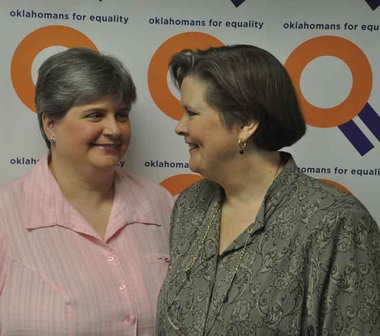New traditions, community support are evolving marriage trends

by Rob Howard
Associate Editor
“Folks want to get married, and we are in the marriage business. I just marry them like I do everybody else,” says Fayetteville, Arkansas, Mayor Lioneld Jordan. Mayor Jordan, a longtime LGBTQ ally, has performed same-sex weddings in his office.
“Just like everybody else” seems to be a theme. The Gaylywanted to find out if there are developing traditions for same-sex ceremonies. With just a few differences, there really is no “same-sex” marriage, there is just marriage.
The one big difference is the durability of same-sex couples. Rev. Mark Williams, Pastor of Spirit of Peace Church in Fayetteville, said, “It’s been very fun to do the legal ceremonies for people who have been together for 10, 15, 25 years.”
Rev. Dwight Welch, Pastor of United Church of Norman (Oklahoma) agrees. He says, “Some of them have been together 25 years, so I might be able to learn something from them.”
Rev. Dr. Rebecca Voelkel, the former Faith Works Director at The Task Force, and former pastor, says weddings have evolved from the time when marriage equality didn’t exist for most of the LGBTQ community.
In the past, “A lot of wedding ceremonies in the specifics of the ritual and the language, were claiming love in the face of oppression - defiantly, with power and God’s blessing, claiming love in this place. I would say there is a lot more conventional stuff in the weddings I do now for queer couples.”
Ceremonies take place everywhere. For Welch it’s mostly at a courthouse or at people’s homes. Williams has done ceremonies ranging from “high religious ceremonies with an officiant who is wearing full vestments.” Others, he says, “are out in the park.”
Courthouse weddings are very simple. Mayor Jordan says, “They call and want to know if I’d marry them. They bring their vows in; sometimes there are five or six people. And they have to have a witness.”
How vows are written is up to the couple. What’s not in the vows? A promise to obey.
Williams says most couples write their own vows. Welch says most couples ask him to write vows for them. He says he always includes two things. “Life is an adventure and you get to share it with another person, with all the challenges ahead, do you promise to support each other?”
The other is that he asks the family and friends there for the service to affirm their support for the couple.
Rev. Voelkel applauds this approach. She said, “The importance of a wedding service is a ritual, how do you lift up your relationship with God, with the couple and with the community?” Support for the couple is important.
“The fun thing is, gay and lesbian people have developed their own traditions and they have been able to bring those into the wedding ceremony,” says Rev. Williams. Both he and Rev. Welch cited a “unity candle” ceremony as being very common. In it, a couple will each take a lighted candle, and then together light a single candle, symbolizing a life together.
Another used by Rev. Williams involves the pastor’s stole. “I’ve taken my stole off my neck and put it around the hands of the couple being married as a sign of a bond, symbolic not only of their bond, but the bond of the couple with the church.”
There is generally a pronouncement; Welch says, “By the power vested in me by the state of Oklahoma, I now pronounce you ‘partners in life.’”
Rev. Voelkel drew a distinction about couples who had commitment ceremonies years earlier, and now were having a state sanctioned marriage. “They were super clear that just because the state had made it legal, didn’t mean that this was somehow more significant than what they had done when they originally had it recognized.” Couples rely on themselves, not the state, to declare their status as a couple.
That may not be a change, but it is a significant attitude we have seen with the arrival of marriage equality.
Copyright 2017 The Gayly – February 15, 2017 @ 7:40 a.m.





